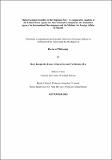| dc.contributor.advisor | Nata, Duvvury | |
| dc.contributor.advisor | Quinn, Gerard | |
| dc.contributor.author | Keogh, Mary | |
| dc.date.accessioned | 2014-09-17T11:19:55Z | |
| dc.date.available | 2016-02-11T13:31:32Z | |
| dc.date.issued | 2014-05-15 | |
| dc.identifier.uri | http://hdl.handle.net/10379/4555 | |
| dc.description.abstract | Intergovernmental organisations such as the United Nations (UN) and the World
Bank claim that the majority of the one billion persons with disabilities
worldwide live in developing countries and are at high risk of poverty and
vulnerable living conditions. The Convention on the Rights of Persons with
Disabilities (CRPD) was adopted in 2006. While first and foremost a human
rights treaty, it is also recognised as having a development mandate requiring
responses by State Parties to respect, promote and fulfill the rights of persons
with disabilities. Article 32 on international cooperation obligates Donor States
to mainstream disability in policies that support international development
programmes. One of its main requirements is to ensure that persons with
disabilities living in poor countries have access to and are included in
development aid.
This thesis investigates how three Donor States and their bilateral agencies
mainstream disability in the policies that support their international development
programmes. Semi structured interviews were conducted with twenty-five key
informants across three jurisdictions; the United States, Finland and Australia.
The data collected from the interviews and documentary analysis highlights the
successes and challenges that Donor States and their respective bilateral agencies
face in mainstreaming disability in international development programmes. | en_US |
| dc.rights | Attribution-NonCommercial-NoDerivs 3.0 Ireland | |
| dc.rights.uri | https://creativecommons.org/licenses/by-nc-nd/3.0/ie/ | |
| dc.subject | International law | en_US |
| dc.subject | Development aid | en_US |
| dc.subject | Disability rights | en_US |
| dc.subject | School of Law | en_US |
| dc.title | Mainstreaming disability in development aid: A comparative analysis of the United States Agency for International Development, the Australian Agency for International Development and the Ministry for Foreign Affairs of Finland | en_US |
| dc.type | Thesis | en_US |
| dc.contributor.funder | PRTLI funding | en_US |
| dc.local.note | This thesis focuses on the CRPD, Article 32 and the enabling role of international cooperation in supporting the development of an inclusive society. It investigates how three donor countries US, Finland and Australia have mainstreamed persons with disabilities in their overseas development programmes. | en_US |
| dc.local.final | Yes | en_US |
| nui.item.downloads | 2377 | |


